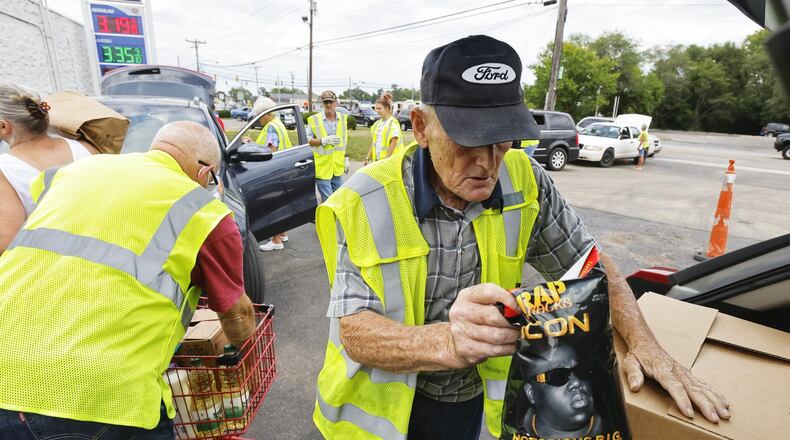“We are not able to predict food supply and demand needs that we are constantly having to adjust what we source and how we distribute it,” he said.
At the start of the pandemic, Gov. Mike DeWine ordered the Ohio National Guard to assist food banks across the state to distribute food. Perdue said their support helped with mass distributions and providing uninterrupted service to partner agencies.
That help also boosted longer-term projects, like purchasing a new cooler and additional equipment like forklifts, pallet jacks, trucks, and racking to expand vertical storage capacity. The food bank also improved its logistical support with more efficient delivery routes and retail rescue pick-ups.
Credit: Nick Graham
Credit: Nick Graham
Though Shared Harvest saw the highest demands in its history early on in the pandemic, the Ohio National Guard filled in for a lack of volunteers until its mission ended on July 2. Perdue said “we have been feverishly trying to secure extra hands to rebuild our volunteer base. We are fortunate to have several who have committed to coming back.”
For the time being, the demand for Shared Harvest services is at pre-pandemic levels. Before the pandemic, Shared Harvest served an average of 26,000 people a month through distribution events. In May 2020, as the state imposed health restrictions impacting the workforce, the food bank served more than five times that number. More than 142,700 people a month needed help as of May 2020.
By May 2021, that average was 22,800.
Part of Shared Harvest’s mission is to help supply food to area pantries, like Village Food Pantry in New Miami, which conducts a drive-thru distribution event every Wednesday. The need is “constant,” said Village Food Pantry Director Pamela Benson.
“It doesn’t seem like it’s going down, it seems like it’s going up,” said of the 180 to 200 families they serve from 3 to 6 p.m. every week. “We thought we’d decrease with going back to work, but there’s no decrease at all.”
Benson said because of the demand, donations and volunteers are more needed than before.
“We have some grant applications out, but right now we are in need of donations because of the numbers,” she said of the 20 to 25 weekly volunteers that cannot keep up with the demand. “We don’t turn any help away.”
Credit: Nick Graham
Credit: Nick Graham
Fairfield Food Pantry Manager Wayne Patten said they’ve seen a recent increase in clients as extra money provided by the state and federal government is gone.
During the height of the pandemic, about 1,300 clients were served each month, though that number dropped to 800 a month by May. Those numbers are rising, said Patten, though June numbers aren’t yet available. Before the pandemic, the Fairfield pantry was serving a little more than 1,000 people a month.
“As we were talking with some of our clients, they were saying, ‘We were able to get by on stimulus money,’ or ‘Our unemployment’s running out,’ and now people are returning, and our numbers are going back up pretty quickly,” he said.
And like with Shared Harvest, Fairfield Food Pantry also saw some volunteers stop due to concerns of the COVID-19 virus as they were more at risk, but new volunteers stepped up.
At Shared Harvest, Perdue said he is mostly concerned now with how businesses respond to the Delta variant as that could cause a domino effect on everything the food bank does.
“If businesses close or serve fewer customers, particularly in the service industry, workers will either be laid off or earn less money if they depend on tips,” he said. “That then increases those who turn to our charitable food network for help.”
Shared Harvest is starting a new weekly distribution channel beginning this week. From 1 to 3 p.m. every Friday, starting with this Friday, Shared Harvest will offer a weekly drive-through food distribution event. Households earning less than 200% of the federal poverty level and are in need of food may pre-register through the food bank’s Facebook page, www.facebook.com/sharedharvestfoodbank/events, or by calling 513-881-9024 between 7:30 a.m. and 3:30 p.m. weekdays.
FACTS & FIGURES
Isolating the past three months of May best illustrates the impact the COVID pandemic had on Shared Harvest Food Bank, according to Executive Director Terry Perdue.
May 2021: 22,814 people served
May 2020: 142,727 people served
May 2019: 25,832 people served
Source: Shared Harvest Food Bank
About the Author



